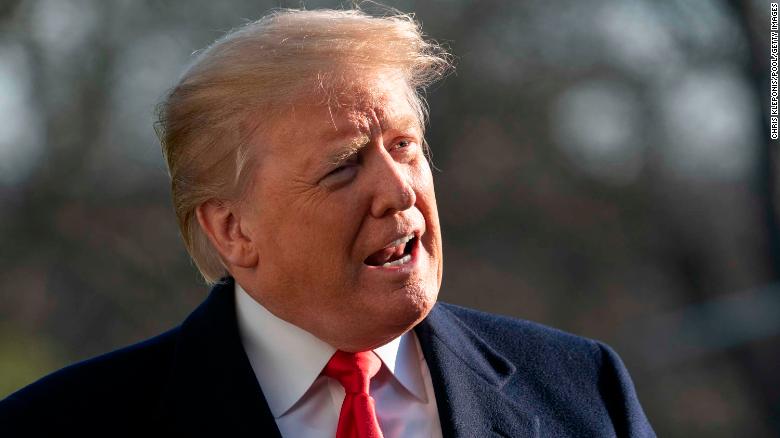
If the government shutdown
lasts much longer, President Donald Trump's only way out may involve a choice
between two pillars of his political viability -- his border wall and his
purring economy.
More and more Americans are feeling the effects of the partial
shutdown every day, from travelers stuck in security lines to Coast Guard
officers now joining the hundreds of thousands of federal employees going
without pay.
Yet the normal political pressure points that usually end shutdown
standoffs are not working, perhaps because of the unique dynamics of the Trump
era. As a result, there's every chance that the stalemate now in its 27th day
could drag on much longer.
Trump told supporters on Tuesday, for example, "We're going to
stay out for a long time if we have to."
Sen. John Kennedy, who flew on Air Force One with the President on
Monday, said Trump is adamant that he's not budging.
"He is a carnivore -- and on this one he believes he is right,"
the Louisiana Republican said.
In another sign the impasse could be extended, House Speaker Nancy Pelosi asked the President to move
the day of the State of the Union address -- now set for January 29 -- or
deliver it in writing because of overstretched security agencies. A White House
official familiar with preparations told CNN's Jim Acosta Wednesday night that,
"at this point," Trump still plans to deliver the speech as scheduled
on January 29.
Shutdowns usually end when either side, the President or Congress,
begins to feel unbearable pressure and the cost of going on outweighs the
political damage sustained by a climbdown.
Since that pivot point is not yet at hand, longer-term factors may
come into play. One significant pressure point could be the side effects of the
shutdown on economic growth, unemployment and consumer confidence.
If the standoff over the President's demand that Democrats provide
$5.7 billion in wall funding is prolonged, the chances of genuine damage to the
economy -- one of the unarguable hot spots of Trump's presidency -- rise
significantly.
Kevin Hassett, who chairs the White House Council of Economic
Advisers, has warned that the impact of the shutdown on
government contractors is higher than expected and could significantly shave
growth figures.
"We subsequently, right now, think that it's about a tenth of
a percent a week, not a tenth of a percent every two weeks," Hassett told
reporters on Tuesday.
His comment was intended to pile pressure on Democrats on Capitol
Hill to give in to Trump's demands. But it also served to underline the risk to
the President, who arguably has more at stake over the economy than Democrats.
JPMorgan Chase CEO Jamie Dimon on Wednesday called the shutdown a
"self-inflicted wound" and "negative" for the economy.
Trump rarely misses a chance to celebrate historically low
unemployment numbers and strong growth figures. Good economic indicators will
be crucial to his hopes of re-election and could blunt Democratic attacks next
year as he seeks to retain Midwestern industrial states that paved his way to
the White House.
So if the economic damage from the shutdown starts to add up, it
could begin to weigh much more heavily on Trump's political calculations.
Economy is 'incredibly strong'
White House spokeswoman Sarah Sanders tried Wednesday to squash a
growing narrative that the shutdown could put a dent in the Trump economy.
"We are focused on the long-term economic goals of the
administration," Sanders said. "We have an incredibly strong economy,
thanks to the President. We look forward to reopening the government,
continuing to build on what we've done the last two years."
An economic headache could prove to be one way Trump begins to feel
political heat over the shutdown, especially if it starts to reverberate in the
stock markets, which have steadied after a volatile period at the turn of the
year.
But if the economy tempts him to cave, it will be a difficult
choice, since the shutdown may be the last best chance to get funding for the
wall during his term. While he could vow to continue the fight for the border
wall in his re-election race, his promises could be devalued if he is defeated
by Democrats this time around.
So far, the President has not seemed to be moved by the traditional
leverage points that occur during shutdowns.
He's not showed much sympathy for government workers forced to go
without pay, even suggesting that they want him to stand firm and get his wall.
And since he's not made much effort to broaden his political
coalition in office, he has few middle-of-the-road voters to lose from digging
into a showdown that pleases his base.
Democratic leaders are trying to change the equation. Senate
Minority Leader Chuck Schumer on Wednesday invoked the plight of a government
worker who missed a paycheck last week and is uncertain he can afford
medicines.
"I want President Trump to look into these faces and see what
he is doing by using these men and women as pawns, using them in an extortion
game," the New York Democrat said.
"Mr. President, President Trump, look at the pain and
suffering you're causing," Schumer said.
But Trump has so far proven impervious to such appeals. A President
who has always had a strong connection with the people who sent him to the
White House is calculating he still has some breathing room.
Polling polarization over the wall
New polling on Wednesday showed the price the President could pay
if if he were to cave in on the wall, a fundamental campaign promise that is
one of the keys to his bond with grass-roots supporters.
A Pew Research poll found that 79% of Democrats and
Democratic-leaning independents see the shutdown as a "very serious"
problem for the country, but just 35% of Republicans and Republican leaners
feel the same way.
And emphasizing why neither party thinks it's in a political
position that could prompt a compromise, 82% of Republicans and Republican
leaners back a substantial expansion of the border wall. Only 6% of Democrats
agree.
Democrats are indeed in a strong political position. Pelosi is at
the apex of her power as speaker just months after the Democratic midterm
election triumph. She has also been able to deflect Trump's blame over the
stalemate by passing bills to open individual agencies -- that have gone
nowhere in the Senate.
In a letter to the President on Wednesday she pulled off a true
power play, saying that owing to security concerns amid the shutdown, he should
reconsider the date for his State of the Union address.
Since the chance to address a joint session of Congress in an
annual television ritual is the kind of high-profile event Trump loves, Pelosi
gave the President little choice.
In effect, Pelosi was sending Trump a reminder of her power, and a
message that if he wants to get his live State of the Union address, he will
have to drop his demands and reopen the government.
Trump tried his own power move, inviting a group of moderate
Democrats to the White House as part of a bipartisan group of moderates,
seeking to peel them away from Pelosi.
But one of the lawmakers, Rep Josh Gottheimer of New Jersey, told
CNN's Manu Raju that he stressed the core Democratic position to the President.
"It's very hard to actually find an agreement on a way forward
on these other issues that are pressing without actually reopening the
government," Gottheimer said.
His comments were a fresh sign that the internal political forces
in Washington that could break open the stalemate are not yet in place, meaning
it could take a significant nudge from outside -- perhaps a slowing economy --
to break the deadlock.












0 comments:
Post a Comment